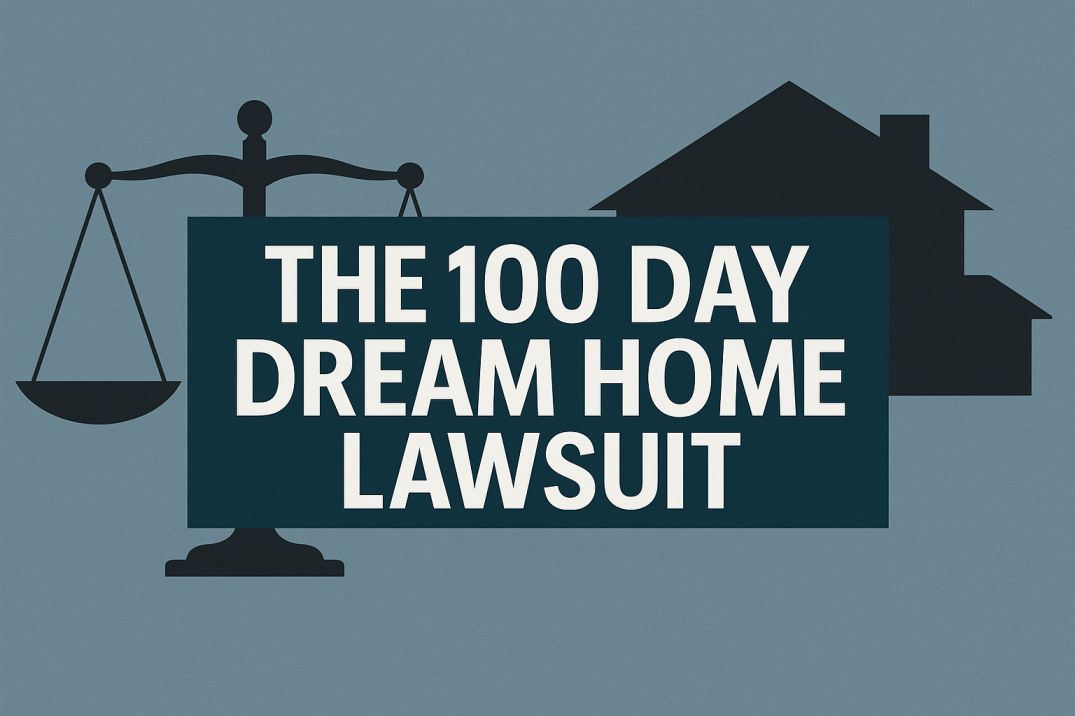HGTV’s 100 Day Dream Home made a bold promise. It claimed to deliver fully customized homes in just 100 days. Hosts Brian and Mika led each project. They worked with couples to design and build dream homes from scratch. Their energy and teamwork won fans quickly.
The show looked smooth and stress-free on screen. But real problems started to build off camera. Several homeowners now say the show didn’t live up to its promise. They report long delays, poor workmanship, and surprise costs.
These claims have sparked a legal battle. Homeowners are taking action. They want answers and compensation. The case is growing and gaining public attention.
This article breaks down what happened. It explains the key issues in the lawsuit. It also looks at how this case could change other home renovation shows.
What Triggered the 100 Day Dream Home Lawsuit?
Homeowners joined the show hoping to get a new home in 100 days. They signed contracts based on this promise. Things did not go as expected. Some homes took much longer. Some had major construction flaws.
Several homeowners filed legal complaints. They said the team broke the contract. They also claimed false advertising and poor construction. These homeowners spent time and money. They trusted the process. Many say they were left disappointed and stressed.
The Main Claims in the Lawsuit
Breach of Contract
Each participant signed an agreement. The contract listed deadlines, materials, and costs. It clearly promised a home in 100 days. Some homes went far beyond the timeline. Extra delays caused added expenses. Homeowners said the team broke the deal. This claim forms the base of the lawsuit.
False Promises
The show claimed to offer premium quality in record time. Many homeowners said they received cheap materials and rushed work. They expected a luxury finish. The results often fell short. Poor communication made things worse. Some owners said they didn’t get cost updates until it was too late.
Low-Quality Construction
Owners found plumbing leaks, weak wiring, and cracked walls. They said builders cut corners to meet deadlines. Fast work affected safety and durability. These issues added stress and financial pressure.
Misleading Ads
The show marketed beautiful homes done in 100 days. It showed smooth builds and happy clients. Owners said their experience did not match the ads. Many said the show hid real problems. These claims form the basis of false advertising.
Delays and Surprise Costs
Delays came from material shortages, crew issues, and weather. Owners said no one warned them. Contracts did not explain added costs clearly. Some were charged penalties. Others had to pay for extra labor. Delays caused missed deadlines and broken trust.
Legal Action and Who’s Involved
The lawsuit went to a local civil court. Multiple homeowners joined the case. They sued the show’s producers, builders, and sponsors.
They want repayment for delays, repair bills, and stress. They claim the team broke promises and misled clients. The show’s side blamed supply issues and weather. They said the delays were not in their control.
Both sides shared documents in court. They presented written contracts, photos, and expert reports. Witnesses from the builds gave statements. The court is now reviewing the case.
What Happening Now?
The lawsuit is still in progress. The case has not reached a final judgment. Court proceeding include pre trial motion discovery and ongoing hearing. Both sides are preparing their arguments. Lawyers are presenting documents, emails, and witness statements.
No verdict has been issued. The timeline remain unclear. The court will take time to review the evidence and testimonie. Settlements may still happen before a trial ends.
The network continues to air the show. New episodes are still being promoted. But the legal spotlight has raised concerns. Viewers have started to question what happens behind the scenes. Public trust is at risk.
The producers face pressure. They may need to adjust how they manage timeline contract and client expectation. A ruling against them could change how they operate the show. It could also affect other HGTV programs.
This case is a warning. Reality shows are no longer safe from legal consequences. What looks polished on screen may face real-world legal tests.
What This Means for Other Home Shows
This lawsuit sends a message to the entire home renovation industry. Viewers no longer trust everything they see on TV. The glossy edits, fast timelines, and happy endings often hide real issues. Reality shows like Property Brothers have also faced lawsuits. Homeowners have claimed unfinished work, poor quality, and broken promises.
Many people now ask harder questions. Can these shows deliver what they promise? Or are they just entertainment?
This case may lead to stronger rules for home shows. Producers might need to be more honest in how they present projects. They may have to show real timelines, real costs, and real risks. Contracts must be clear. Clients must be protected.
Future shows will face more pressure to act with care. They can’t sell dreams if they can’t deliver. Viewers want the truth. They want homes that last—not quick builds that fall apart after filming.
This lawsuit might push networks to rethink their approach. They may review how they select builders, approve timelines, and manage projects. That change could protect homeowners and rebuild public trust.
Television should inspire, not mislead. The 100 Day Dream Home lawsuit could help make sure of that.
Final Thoughts
The 100 Day Dream Home lawsuit raises serious questions. Can builder really deliver a safe high quality custom home in just 100 days? Or do shows like this sell a dream that breaks under real pressure?
Many homeowners in this case feel cheated. They put their trust in a process that promised fast results and premium finishes. Instead, they faced unfinished work, surprise costs, and emotional stress. Some now deal with repairs they never planned for. Others say the experience damaged their financial stability.
They are not only asking for refunds. They want someone to take responsibility. They want the truth to come out. Their goal is to stop this from happening to other.
The outcome of this lawsuit may shift the home renovation industry. It could force networks to set clear rules for what they show. No more fast-forwarded edits that skip the problems. No more promises that builders can’t keep. Viewers deserve honest timelines. Homeowners deserve solid contracts.
Builders may also face new standards. They might need to slow down, plan better, and communicate clearly. Contracts could change. Marketing claims may face stricter checks. That would protect future clients from making costly mistakes.
This case is bigger than one show. It speaks to how media shapes real choices. Families watch these shows and believe they can do the same. When things go wrong, the impact is deep and personal.
Industry pros, viewers, and legal experts are watching closely. The final court decision may guide how future shows get filmed, marketed, and managed. It may set a new tone for what “dream home” really means in the real world.
In the end this lawsuit is not just about homes. It about trust truth and accountability.




